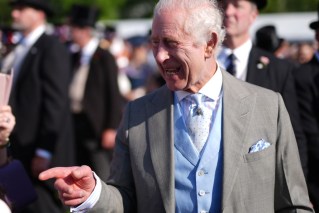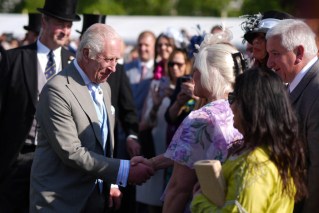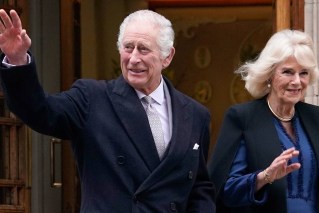Changes between the coronation of a king and his mother reveal huge social shifts

Among the guests at Queen Elizabeth’s 1953 coronation ceremony, a young boy seated in Westminster Abbey’s royal box gazed in wide-eyed wonder at the glittering events unfolding before him, his reactions swinging from excitement to boredom as the three-hour long service played out.
Seated between his grandmother, the Queen Mother, and his aunt, Princess Margaret, four-year-old Prince Charles tugged eagerly at his adored granny’s arm as he watched his mother being crowned Queen of the United Kingdom.
“I have vivid memories of the coronation, of my mother coming to say goodnight to my sister (Princess Anne) and me while wearing the crown so she could get used to its weight before the coronation ceremony,” Charles said about the eve of the big day.
Now, seven decades later, Charles, 74, becomes the oldest monarch in British history to ascend the throne, a role formalised on Saturday with his pomp-and-pageantry coronation following the death of the Queen on September 8.
While much of the tradition in Queen Elizabeth’s ceremony will form part of King Charles’s coronation, the service seeks to recognise the immense cultural and societal changes experienced in the United Kingdom and the Commonwealth throughout the previous decades.
‘The monarch’s role today’
“The coronation will reflect the monarch’s role today and look towards the future, while being rooted in longstanding traditions and pageantry,” Buckingham Palace stated.
King Charles’s coronation will maintain such traditions as the use of centuries-old regalia and Chrism oil to anoint the monarch and Camilla, the Queen Consort, while cutting back on the number of guests and the length of both the ceremony and the processional route.
It is believed the king will also dispense with the centuries-old practice of having family members kneel before the monarch in homage to the new king, with the possible exception of his son and heir, Prince William.

William will feature more prominently in the coronation than his younger brother Harry.
In a coronation first, and as a reflection of King Charles’s long held multi-faith beliefs, the service will include peers representing four non-Christian faiths — Hindu, Jew, Muslim and Sikh — to present the monarch with four key pieces of coronation regalia. (The Queen’s coronation included only one non-Church of England cleric — from the Presbyterian Church of Scotland.)
“I am a committed Anglican Christian and at my coronation take an oath relating to the Settlement of the Church of England,” Charles said in the days following his mother’s death, adding he had a duty as sovereign “to protect the diversity of our country, including by protecting the space for faith itself”.
The challenge for the new king is not just in accommodating a more diverse ethnic and religious Britain, but in adapting to the flagging support for the monarchy.
Just days out from the royal event, the BBC Panorama program released data from a poll of more than 4500 participants that revealed 58 per cent backed the continuance of the monarchy, but only 36 per cent believed King Charles was in touch with the British public.
Pared down event
If the monarchy is to remain relevant in the modern era, a pared down coronation recognising the United Kingdom’s current economic woes and reflecting the societal and cultural changes of the past 70 years is key to kicking off the Carolean reign.
Thus, the ceremony will be up to 90 minutes shorter than the Queen’s three-hour event; the processional route will shave off nearly 5km, and the guest list has been reduced from 8000 to 2000.
Australia will be represented by the Governor-General David Hurley, Prime Minister Anthony Albanese, soccer darling Sam Kerr, as the nation’s flag-bearer, and musician Nick Cave, among others.
While these concessions, along with the unprecedented inclusion of female clergy in the coronation ceremony appear in line with today’s expectations, the wisdom of a call for millions of Commonwealth citizens to swear allegiance to the king in a “chorus of millions of voices” is yet to be seen, with critics labelling it “beyond the pale”.
The invitation to pay homage announced by the Archbishop of Canterbury, who will anoint the king, drew the ire of the British Republic pressure group CEO Graham Smith who declared: “This kind of nonsense should have died with Elizabeth I, not outlived Elizabeth II.”
But for all its detractors, the monarchy still has the ability to galvanise the British public with the grandeur of a royal event — a fact borne out every time a royal gets hitched (Prince William and Kate Middleton’s 2011 nuptials attracted 24 million viewers, while 18 million Brits tuned into Prince Harry and Meghan Markle’s 2018 wedding).
Tens of thousands of royal fans are expected to line the streets to watch the procession, while millions will tune into the live televised ceremony with eyes not just on the King and Queen but on young Prince George performing his role as Page of Honour and Prince Harry, whose relationship with his family remains strained following controversial comments in his autobiography Spare and the Netflix series Harry & Meghan.
In anticipation of a national knees up, the British Home Secretary, Suella Braverman, has extended pub licensing by two hours, with the British Beer and Pub Association estimating pubs and breweries will pour as many as 62 million pints over the celebratory coronation holiday weekend.
“Up and down the country,” Ms Braverman said, “people can enjoy an extra pint or two in the evening while families and friends can come together to wish His Majesty the King a long and happy reign.”








